语法点梳理(虚拟语气 从句连接词)
(完整版)英语虚拟语气语法归纳总结
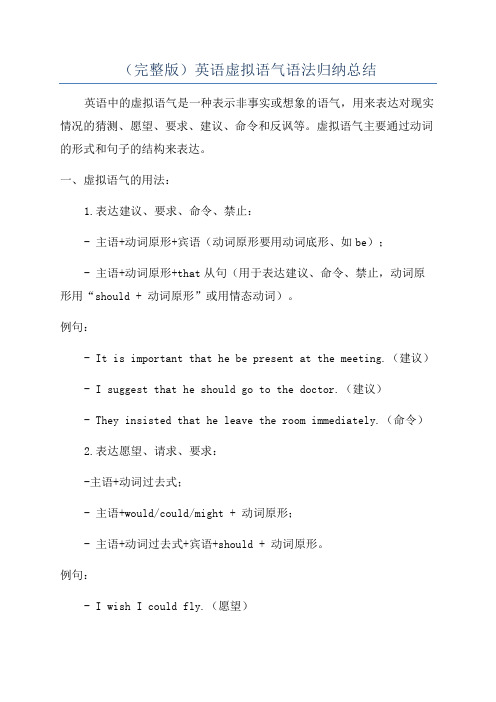
(完整版)英语虚拟语气语法归纳总结英语中的虚拟语气是一种表示非事实或想象的语气,用来表达对现实情况的猜测、愿望、要求、建议、命令和反讽等。
虚拟语气主要通过动词的形式和句子的结构来表达。
一、虚拟语气的用法:1.表达建议、要求、命令、禁止:- 主语+动词原形+宾语(动词原形要用动词底形、如be);- 主语+动词原形+that从句(用于表达建议、命令、禁止,动词原形用“should + 动词原形”或用情态动词)。
例句:- It is important that he be present at the meeting.(建议)- I suggest that he should go to the doctor.(建议)- They insisted that he leave the room immediately.(命令)2.表达愿望、请求、要求:-主语+动词过去式;- 主语+would/could/might + 动词原形;- 主语+动词过去式+宾语+should + 动词原形。
例句:- I wish I could fly.(愿望)- I would appreciate it if you could help me.(请求)3.表示虚拟条件:- If条件从句中的谓语动词用过去完成时,主句用would/should/might/could + have + 过去分词;- If条件从句中的谓语动词用过去时,主句用would/should/could + 动词原形。
例句:- If I had known his phone number, I would have called him.(虚拟条件)- If you had listened to me, we could have finished the project earlier.(虚拟条件)4.表达建议、要求、祝愿:- If only内部称述 + 主语 + 过去式。
英语语法 虚拟语气的知识点归纳
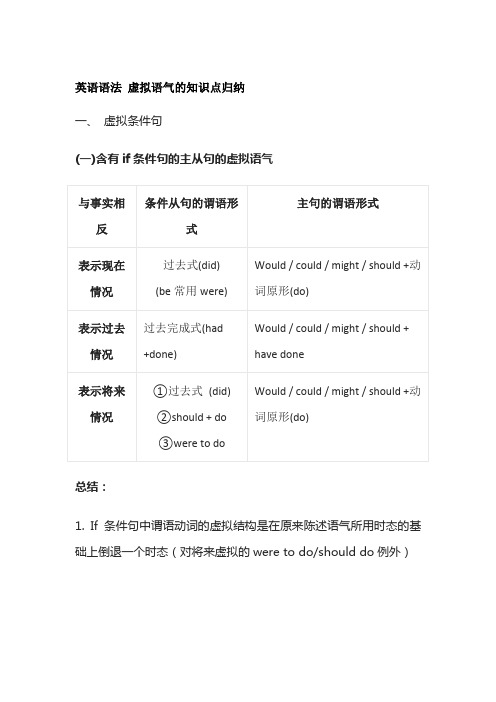
英语语法虚拟语气的知识点归纳一、虚拟条件句(一)含有if条件句的主从句的虚拟语气总结:1. If 条件句中谓语动词的虚拟结构是在原来陈述语气所用时态的基础上倒退一个时态(对将来虚拟的were to do/should do例外)2. 主句要借助于情态动词的过去式,后跟动词原形(现在或将来)或have done(过去);if条件句中只出现一个情态动词,即对将来虚拟的should.3.做此类题目时一定要分清是从句还是主句谓语动词的虚拟,还要把握好时态。
注意:1. 在虚拟条件从句中,动词“be”的过去时态一律用”were”,不用was。
2. 在虚拟条件状语中如果有were, should, had这三个词中任何一个,可省略if,把这三个词提到主语之前, 变成:were/should/had +主语+剩余成分。
3.在虚拟条件状语从句中,省略连词的倒装形式的句首不能用动词的缩略形式。
如我们可说Were I not to do., 而不能说Weren‘t I to do。
4.在表示与将来事实相反的条件句中,只能用should,而不能用would,could和might 等。
5.主句中的should通常用于第一人称,would,could以及might 可以用于各种人称eg :①If I were a bird, I could fly in the air.如果我是一只小鸟,我就能在空中飞行。
②I wish I could pass the examination.我希望我能通过考试。
在虚拟条件句中,对于与将来事实相反的情形,请注意以下几点:(1)条件从句表示的内容与将来事实相反,实为对将来情况的推测,用过去时表示虚拟;(2)条件从句谓语除用过去式外,有时也用“should+动词原形(表示可能性极小,常译为“万一”)”或“were to+动词原形(表示与将来事实相反的假设)”;(3)条件从句使用“should+动词原形”这样的谓语形式时,主句谓语除可用“should (would, could, might)+动词原形”这样的虚拟语气形式外,也可用直陈语气或祈使语气。
英语语法 虚拟语气的知识点归纳
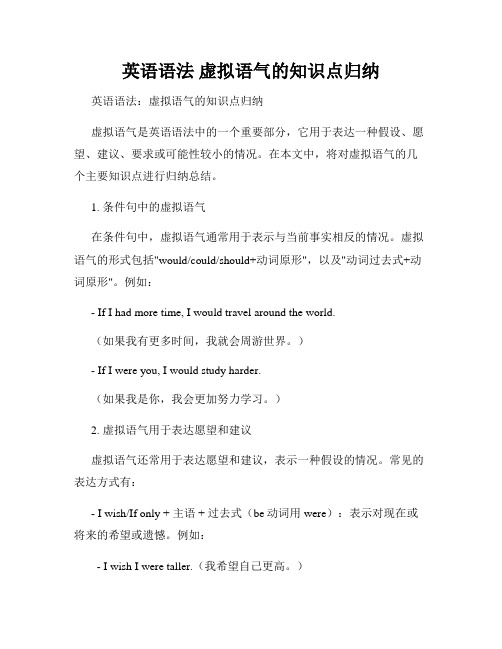
英语语法虚拟语气的知识点归纳英语语法:虚拟语气的知识点归纳虚拟语气是英语语法中的一个重要部分,它用于表达一种假设、愿望、建议、要求或可能性较小的情况。
在本文中,将对虚拟语气的几个主要知识点进行归纳总结。
1. 条件句中的虚拟语气在条件句中,虚拟语气通常用于表示与当前事实相反的情况。
虚拟语气的形式包括"would/could/should+动词原形",以及"动词过去式+动词原形"。
例如:- If I had more time, I would travel around the world.(如果我有更多时间,我就会周游世界。
)- If I were you, I would study harder.(如果我是你,我会更加努力学习。
)2. 虚拟语气用于表达愿望和建议虚拟语气还常用于表达愿望和建议,表示一种假设的情况。
常见的表达方式有:- I wish/If only + 主语 + 过去式(be动词用were):表示对现在或将来的希望或遗憾。
例如:- I wish I were taller.(我希望自己更高。
)- If only she could speak fluent English.(要是她能说一口流利的英语就好了。
)- It is time + 主语 + 过去式(should + 动词原形):用于表示现在或将来应该发生的动作。
例如:- It is time we started the meeting.(是时候开始会议了。
)- It is time you should apologize to her.(你应该向她道歉了。
)3. 虚拟语气在宾语从句中的使用在宾语从句中,若主句的动词表达了建议、命令、要求等含义时,宾语从句中的谓语动词常使用虚拟语气。
具体的用法如下:- 建议:suggest/recommend + (that) + 主语 + (should)+ 动词原形。
虚拟语气英语知识点总结

虚拟语气英语知识点总结一、虚拟语气的概念。
虚拟语气是一种特殊的动词形式,用来表示说话人所说的话不是一个事实,而是一种假设、愿望、怀疑、猜测或建议等。
二、虚拟语气在条件句中的用法。
1. 与现在事实相反的虚拟条件句。
- 结构:从句(If + 主语+ 动词的过去式(be动词一般用were)),主句(主语+ would/should/could/might+动词原形)。
- 例如:If I were you, I would study harder.(如果我是你,我会更努力学习。
实际上我不是你)2. 与过去事实相反的虚拟条件句。
- 结构:从句(If+主语+had+过去分词),主句(主语+would/should/could/might + have+过去分词)。
- 例如:If he had taken my advice, he would have passed the exam.(如果他听了我的建议,他就会通过考试了。
实际上他没听建议,也没通过考试)3. 与将来事实相反的虚拟条件句。
- 结构:从句(If+主语+动词的过去式/should+动词原形/were to+动词原形),主句(主语+would/should/could/might+动词原形)。
- 例如:If it rained tomorrow, we would stay at home.(如果明天下雨,我们就会待在家里。
明天是否下雨还不确定,但这是一种假设情况)- 或者If he should come tomorrow, I would tell him the news.(如果他明天来,我就会告诉他这个消息)- 以及If I were to see her tomorrow, I would give her the book.(如果我明天见到她,我就会把书给她)三、虚拟语气在宾语从句中的用法。
1. wish后的宾语从句。
- 表示与现在事实相反的愿望,从句谓语动词用过去式(be动词用were)。
英语虚拟语气语法归纳总结

虚拟语气:表示说的话不是事实,不可能发生或者说可能性很小的情况,表达一种愿望、建议、假设。
一、条件状语从句中的用法简单记法:if were/did, would doif had done, would have doneif were to do/should do, would do举例:If I were you, I would do nothing about it.If you had taken your teacher’s advice, you wouldn’t have made such a mistake.If it were to/ should rain tomorrow(表示降水率很低),they wouldn’t go shopping.附注:虚拟语气,条件状从倒装状语从句中,去掉if, 提前were/ had/ should如:If I were you, I would give up.→Were I you, I would give upIf you had taken the advice, you would have….→Had you taken the advice, you would have…If the world should come to an end,……→Should the world come to an end……另外,without, but for, otherwise构成的条件状语从句中,也有含蓄的虚拟语气But for the popularization of electricity, we would lead a whole different life today.(popularization 普及,publicity 宣传)Without your help, I would have failed.We’ll go earlier, otherwise we wouldn’t get a seat. (表示可能性小)但其实,高中英语考试也常考:错综虚拟语气条件句即:假设条件状从发生的时间与所假设的谓语动词不一致,此时,主句和从句要根据各自的时间而定。
英语语法 虚拟语气知识点

虚拟语气1. 表示现在/过去/将来情况的虚拟条件句虚拟条件句主要有三种结构:1)表示与现在情况相反:主句谓语用“would / could / might +动词原形”,从句谓语用“动词的一般过去时”(动词be的过去式一律用were)。
If I were you, I would not accept his offer.If I had time, I would certainly go to the cinema with you.2) 表示与过去情况相反:主句谓语用“would / co uld / might + have +过去分词”,从句谓语用过去完成时。
If I had got up a little earlier, I wouldn’t have missed the train.If I had been more careful, I might have passed that exam.3) 表示与将来情况相反:主句谓语用“would / could / might +动词原形”,从句谓语用“were +动词不定式”或“should +动词原形”。
If I were to do the job, I would not be able to have enough time to study.If it should rain tomorrow, I would not go out with you.2. 虚拟条件句连接词if的省略如果虚拟条件句的从句中含有were, had, should, could等词时,可以省略连接词if,但这时必须把were, had, should, could等词移到主语前面,形成倒装。
这种句型主要用于书面形式。
Were I to do the job, I would finish doing it within two weeks.Had it not been for his help, we couldn’t have arrived there on time.Should it rain tomorrow, I would stay at home.3. wish后宾语从句中的谓语构成动词wish后的宾语从句表示未实现的或不可能实现的愿望,其宾语从句中的谓语动词要用虚拟语气,有以下三种构成形式。
高中英语语法讲解——虚拟语气
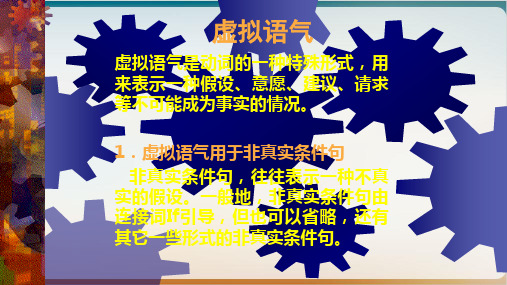
2.这类主语从句常常用于表示要求、建议、 命令、请求、提议等,其谓语形式往往为 “ ( should)+ 动 词 原 形 ” 的 形 式 。 在 美 国,常省略should,而在英国,则往往不 省略should。
比如:
--It is necessary that the machine (should) be oiled everyday. 机器必须天天上油。
1.1.1.和现在事实相反的非真实条件句
这类非真实条件句表示和现在事实相反的情况。比如: --I would/should certainly go if I had the time.
如果我有时间,我一定会去的。 --If I were your father, I would criticize you more
--I never expected that the problem should be so complicated.
我从未想到问题会如此复杂。
--They just couldn’t believe that the new stadium should be so big.
他们简直不能相信新的体育馆会如此大。
--The teacher insisted that all the students (should) be on time.
老师要求学生们准时到校。
--He suggested that the regulations (should) be revised. 他建议修改规则。
The lawyer asked that the case (should ) be postponed for one month. 律师要求案子往后推迟一个月。
完整版)虚拟语气语法归纳
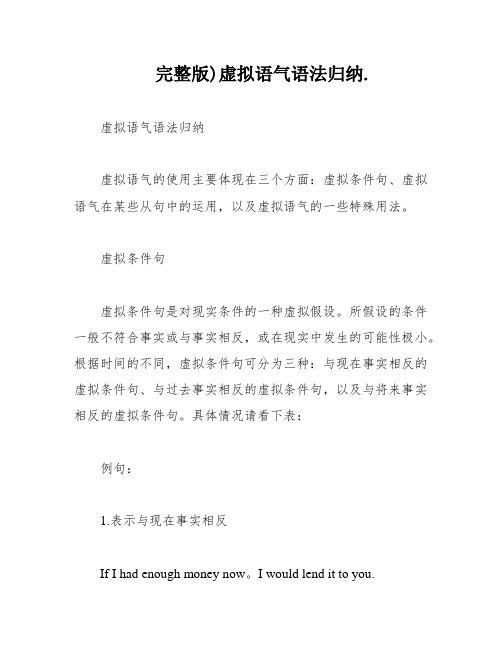
完整版)虚拟语气语法归纳.虚拟语气语法归纳虚拟语气的使用主要体现在三个方面:虚拟条件句、虚拟语气在某些从句中的运用,以及虚拟语气的一些特殊用法。
虚拟条件句虚拟条件句是对现实条件的一种虚拟假设。
所假设的条件一般不符合事实或与事实相反,或在现实中发生的可能性极小。
根据时间的不同,虚拟条件句可分为三种:与现在事实相反的虚拟条件句、与过去事实相反的虚拟条件句,以及与将来事实相反的虚拟条件句。
具体情况请看下表:例句:1.表示与现在事实相反If I had enough money now。
I would lend it to you.If I were you。
I would tell him my true feelings.If I were a boy。
I would join the army.If she had time。
she would go with you.2.表示与过去事实相反If he had XXX your advice。
XXX't have made such a bad mistake.She would have come to enjoy the party if she hadn't been very busy.If he had XXX my advice。
he would have XXX.3.表示与将来事实相反I would go shopping with you if it were Sunday tomorrow.If he were given another chance to do it again。
he could XXX.If it were to rain tomorrow。
the football match would be postponed.1.虚拟条件句的倒装在虚拟条件句中,为了强调所假设条件的虚拟性,或突出说话人的一种主观愿望,虚拟条件句可用倒装结构。
- 1、下载文档前请自行甄别文档内容的完整性,平台不提供额外的编辑、内容补充、找答案等附加服务。
- 2、"仅部分预览"的文档,不可在线预览部分如存在完整性等问题,可反馈申请退款(可完整预览的文档不适用该条件!)。
- 3、如文档侵犯您的权益,请联系客服反馈,我们会尽快为您处理(人工客服工作时间:9:00-18:30)。
as, as if, as though
让步状语从句
although\though, even though\even if, whether …or…
3.If+主语+should do
主语+should\would\could\might
+do
状语从句连接词
时间状语从句
when, while, as, before, after, till\until, since, as soon as, immediately\instantly, the moment\minute\instant, not …until\till
定语从句、名词性从句连接词
从句缺少成分
定语从句
名词性从句
主语\表语
that (人、物), who, which, what
who(人),which(物), what
宾语
that, whom, which, what
whom(人), which, what
定语
whose
whose(人/物)
状语
when, where, why, how
so that, in order that, for fear that, in case, lest, for fear that\in case\lest
结果状语从句
so that, so…that…, such…that…, too…to…, enough to…, so… as to…
条件状语从句
虚拟语气
虚拟条件句
主句
与现在事实相反
If+主语+did\were
主语+should\would\could\might +do
与过去事实相反
If+主语+had done
主语+should\would\could\might
+have +done
与将来事实相反
1.If+主语+did
2.If+主语+were to do
when, where, why, how
不缺成分
that, whether(… or not) , if
注:先行词在定语从句中做宾语可以省略
句首和介词后之用whether不用if
地点状语从句
where, wherever
原因状语从句
because, as, since, now( that), for, seeing( that), considering( that), in that, because of, thanks to, due to, owing to
目的状语从句
